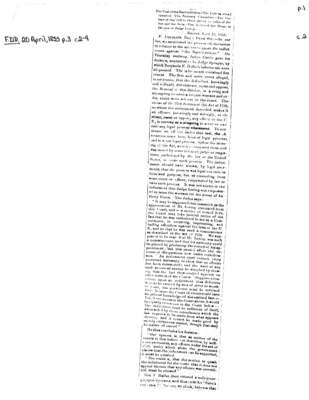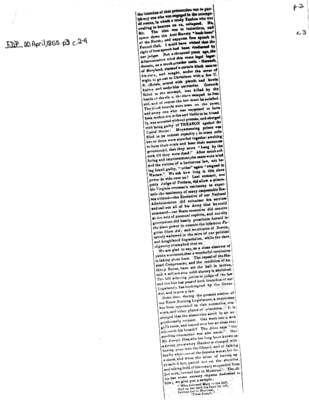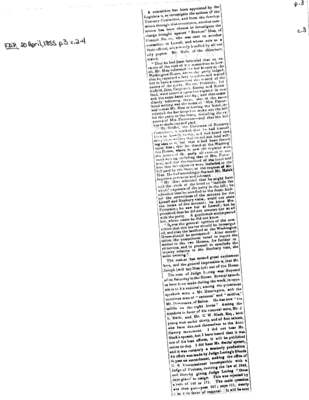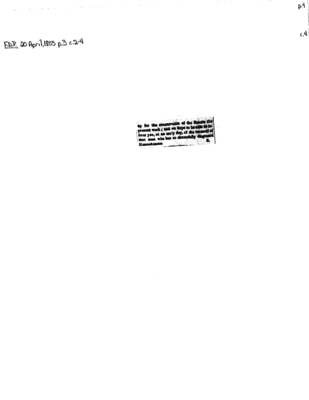Pages
D6762_Page_1
The Trial of the Burn's Rioters—The Indicments all Quashed—The Nunnery Committee—The Passage of the Bill to allow Jurors to judge of the law and the facts—The Action of the House in the case of Judge Loring.
BOSTON, April 15, 1855.
F. DOUGLASS, ESQ: DEAR SIR:—In our last, we mentioned the protracted discussion in relation to the motion to quash the indictments against "the Burn's rioters." On Thursday morning, Judge Curtis gave his decision, concurred in by Judge Sprague, by which Benjamin F. Hallet's indictments were all quashed. The indictments contained five counts. The first and main count alleged, in substance, that the defendant knowingly and willingly, did obstruct, resist and oppose, the Marshal of this district, in serving and attempting to serve a certain warrant and order, which were set out in the count. The clause of the 25th Section of the Act of 1790, on which the indictment defended, makes it an offense, knowingly and willingly, to obstruct, resist or oppose, an officer of the U.S[.], in serving or attempting to serve or execute any legal process whatsoever. To constitute an offense under the law, the obstruction must have been of legal process; and it is not legal process, within the meaning of the Act, unless it emanated from, and was issued by some tribunal, judge or magistrate, authorized by the law of the United States, to issue such process. The indictments should have shown, by legal averments, that the process was legal not only in form and purpose, but as emanating from some court or officer, empowered by law to issue such process. It was not shown in the indictment that Judge Loring was empowered to issue the warrant for the arrest of Anthony Burns. The Judge says:
"It may be suggested that inasmuch as the appointment of Mr. Loring emanated from this Court, and is a matter of record here, the Court may take judicial notice of the fact that he was authorized to act as a Commissioner, in arresting, imprisoning, and bailing offenders against the laws of the U.S., and so that he was such a commissioner as described in the act of 1850. We suppose it to be true that Mr. Loring was such a commissioner, and that his authority could be proved by producing the record of his appointment; but this cannot affect the decision of the question now under consideration. An indictment must contain every averment necessary to show that an offence has been committed; and the want of any such averment cannot be supplied by showing that the fact thus omitted appears on other records of the Courts. Suppose a conviction upon an indictment thus defective were to be carrried by writ of error to another court, the conviction must be reversed there, because the Court of errors could have no judicial knowledge of the omitted fact.— Yet, if erroneous in the Court above, it would be equally erroneous in the Court below.— The indictment must be sufficient of itself, when aided by those intendments which the law requires to be made from what appears therein; and it cannot be made good by merely extraneous matter, though that may be a matter of record."
He thus concludes his decision:
"Our opinion is, that as neither of the counts in this indictment describes, by sufficient averments, any offence under the act of 1790, under which alone the government claims that the indictment can be supported, it must be quashed.
"The result is, that the motion to quash the indictment for the cause that it does not appear therein that any offence was committed, must be allowed."
Ben. F. Hallet then entered a nolle prosequi, upon the cases, and thus ends the "Burn's riot cases." No one, we think, believes that
D6762_Page_2
the intention of that presentation was to punish any one who was engaged in the attempted rescue, in which a [illegible] Yankee who was swelling to become an ox, collapsed. No, Sir. The idea was to intimidate, and cower down the Anti-Slavery "back-bone" of the North; and supress free speech in Faneuil Hall. I could have wished that the right of free speech had been vindicated by our judges. Not a thousand years ago, the Administration tried this same legal leger-demain, on a much grander scale. Gorsuch, of Maryland, claimed a certain black man as his slave, and sought, under the cover of night, to go out to Christiana with a few U.S. officials, armed with pistols and bowie knives, and make him surrender. Gorsuch failed in the the attempt, was killed by the hands of the sla[v]e, the slave esscaped to free soil, and of course the law must be satisfied. The blood-hounds were soon on the scout, and every one who was supposed to have been within ten miles and liable to be friendly, was arrested without process, and charged with being guilty of TREASON against the Unite States! Moyamensing prison was filled to the utmost capacity; in some cells two or three were crowded together awaiting to have their trials and hear their sentences pronounced, that they must "hang by the neck till they were dead." After much suffering and imprisonment, they cases were tried and the victims of a barbarous law, not being found guilty, "order" again "reigned in Warsaw." We ask how long is the slave power to ride over us? Last summer, one potty Judge of Probate, did allow a miserable Virginia overseer's testimony to supersede the testimony of many respectable Boston citizens – the Executive of our National Administration did volunteer his services and call out all of his Army that he could command – our State executive did connive at the writ of personal replivin, and our city government did basely prostitute herself to the slave power to execute the infamous Fugitive Slave Act; and we citizens of Boston, tamely walloweed in the mire of our political and doughfaced degredation, while the slave oligarchy triumphed over us.
We are glad to say, as a close observer of public sentiment, that a wonderful revolution is taking place here. The repeal of the Missouri Compromise, and the rendtion of Anthony Burns, have set the ball in motion, and it will not stop until slavery is abolished. The bill allowing jurors to judge the law and the fact has passed both branches of our Legislature, has been signed by the Governor, and is now a law.
Some time, during the present session of our Know Nothing Legislature, a committee has been appointed to visit nunneries, convents, and other places of education. It is charged thta the committee acted in an un-gentlemanly manner. One went into a sick girl's room, and leaned over her so close that she smelt his breath! The Atlas says "the smelling committee was also smelt." One Mr. Joseph Hiss, who has long been known as a strong pro-slavery Hunker, is charged with having gone into the Chapel, and of talking loudly while one of the females was at her devotions, and when she arose of having approached her, patted her on the shoulder, and taking hold of the rosary suspended from her neck, invited her to Montreal! The Atlas hs some nursery rymes dedicated to him; we give a sample:
"Who followed Mar to the hall, And on her neck his hand let fall, Invited her to Montreal, Twas Joseph."
D6762_Page_3
A committee hsa been appointed by the Legislature, to investigate the actions of the Nunnery Committee, and from the developments through that committee, another comittee has been chosen to investigate the charge brought against "Brother" Hiss, of Council No. –, who wa sent on another committee to Lowell, and whose acts as a State official, are severely handled by our city papers. Mr. Hale of the Advertiser, stated,
"That he had been informed that on occaision of the visit of the committee to Lowell, Mr. Hiss informed the bar keeper as the Washington House, where the party lodged, that he expected a lady to arrive and wished her to have a room – but the record of the names of the party, Messrs. Pilsbury, Littlefield, Hiss, Carpenter, Emesy and Strickland, were entered upon the register in one and the same hand writing; and that immediately following these, also in he same hand writing the name of 'Mrs. Patterson' – and that the bill was so made out and paid.
Mrs. griffin, the Chairman of Nunnery Committee, remarked that he had himself been n Lowell today, and had hear this story everywhere; that he did not lend willing ears to it, but that it had been forced upon him; that he dined at Washington House, where he saw the register with the names of the party all entered in one hand writing, including that of Mrs. Patterson; and that the landlord of the hotel told him that her expenses were included in the bill paid by the State, at the request of Mr. Hiss. He had accordingly deemed Mr. Hale's inquires pertinent and relevant.
Mr. Hiss admitted that he might have told the clerk at the hotel to 'include the whole' expenses of the party in the bill; he admitted that he certified to the State Auditor the correctness of the account for the Lowell and Roxbury visits, could not state the itmes of the account; he knew Mrs. Patterson; he saw her at Lowell; but he protested that he did not connect her at all with the party. A gentleman accompanied her, whose name he did not know.
"It was the general opinion of the committee that this matter should be investigated, and that the landlord at the Washington House should be summoned[.] After consultation, the committee voted to report the matter to the two Houses, for further instructions, and to proceed to conclude the iquiry relative to the Roxbury visit, the same evening."
The matter has caused great excitement here, and the general impression is, that Mr. Joseph (will be) Hiss (ed) out of the House.
The case of Judge Loring was disposed of on Saturday in the House. Several speeches have been made during the week, in oppostion to his removal; among the prominent speakers were a Mr. Huntington, and the notorious man of "cannons" and "saddles," Mr Devereaux, of Salem. He has now "the saddle on the right horse." Among the speakers in favor of his removal were, Mr. J. L. Swift, Mr. .W. Slack, Esq, both young men under thirty, and of fine talents, who have devoted themselves to the Anti-Slavery movement. I did not hear Mr. Slack's speech, but I have heard that it was one of his best efforts, it will be published entire to-day. I did hear Mrs. Swift's speech, and it was certainly a masterly production[.] An effort was made by Judge Loring's friends to pass an amendment, making the office of U.S. Commissioner incompatible with a Jude of Probate, reviving the law of 1843, and thereby giving Judge Loring "three days grace" to resign. This was rejected by a vote of 146 to 171. The main question was then put – yeas 207; nays 111, nearly 2 to 1 in favor of removal. It will be sent up for the [illegible] of the Senate the present week; and we hope to be ablr to inform you, at an early day, of the removal of that man who has so shamefully disgraced Massachusetts.
R.



